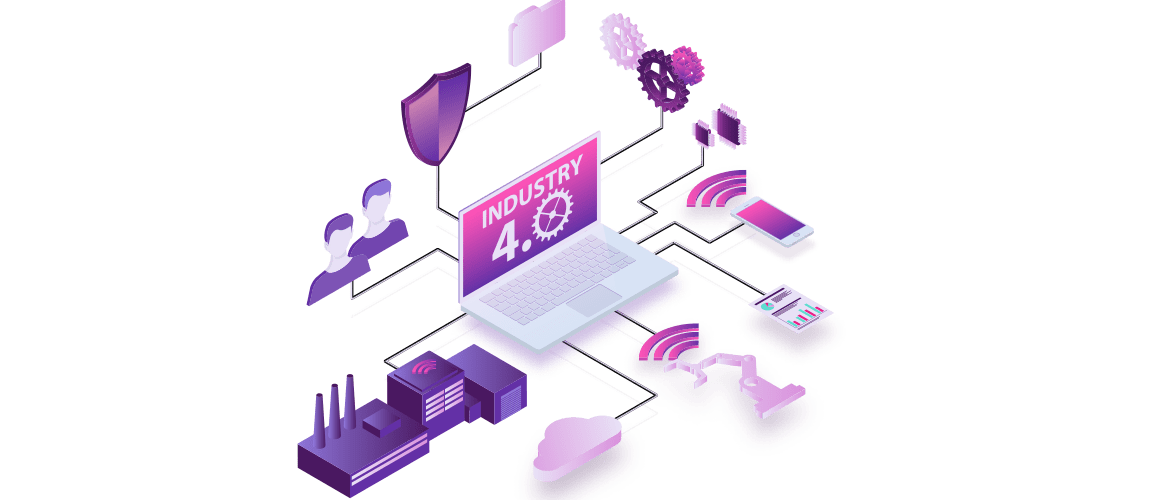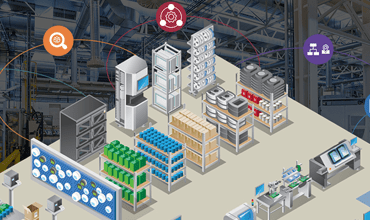Industry 4.0 Benefits & Value Summary:
What is Industry 4.0? The intent of Industry 4.0 is to drive flexibility in manufacturing operations, in order to meet emerging demand patterns of local customers, with the capability of making a high range of products in small batches without the sacrifice of performance as compared to higher volume and more dedicated production scenarios. The focus of industry 4.0 in manufacturing has been mainly on the technology required to connect machines and systems together, with digital solutions that use the data to optimize production and related activities, especially in cases of high-mix and low volume. A simple phrase “build to order with mass production efficiency” is often used to summarize this so-called 4th Industrial Revolution.
What Is Industry 4.0?
Trends that have been affecting the industry progressively over the last decades, specifically the increase in the number of products and variants, the cost of finished goods stock, and the resultant need for high-mix, low-volume production have drastically changed the way in which assembly manufacturing works. The German government recognized the need and opportunity to support small and medium sized business to be better prepared in terms of competitiveness, as the true costs of the mass production business in remote areas of the world was realized, in terms of distribution costs, investment and price depreciation of an escalating amount of stock, and environmental concerns. As increasingly intelligent and flexible automation becomes available, fixed costs of labor can be reduced. Since labor rates are a key element in cost differentiation between local and remote manufacturing, the balance of competitiveness tips in favor of local manufacturing, as long as such automation can be effectively utilized.
The initial real-world effect of Industry 4.0 however, has been for equipment vendors to rush out with their Industry 4.0 messaging, so as to ensure that their existing products are perceived as “future-proof” in the eyes of customers. This led to significant confusion in the market, including a wide range of reinterpretation of what Industry 4.0 represents, especially as customers realized that in the vast majority of cases, what they were now buying was little different from what they had before, made up of existing technologies and proprietary data. Such technologies as IIoT, cloud-based data storage and computing etc. were identified as key requirements, which again, many companies simply offered as a re-packaged legacy bespoke product.
What was subsequently lost, was understanding that Industry 4.0 is not a simple technology change, and is not even primarily targeted at increased operational automation, which is associated more with Industry 3.0, but actually a layer of intelligence above existing automation, responsible for managing, organizing and optimizing operations in line with customer expectation for quick response to rapidly changing demand conditions. Industry 4.0 is therefore essentially a software solution. Aegis is a key driver within the industry, and contributor to standards and technologies which drive interoperability of data flow from and between hardware automation and other manually performed processes across the manufacturing space.
The Importance of Contextualization of Data For Industry 4.0
Unlike any other solution for manufacturing in the market, FactoryLogix was conceived based on modern software principles, a single platform, founded on IIoT technology, providing numerous interfaces that make the best use of data available from machines in native formats, all the way through to supporting the latest IIoT data exchange standards.
Though raw machine data may be directly useful in machine specific learning, and machine to machine closed-loop applications, the data from each specific machine has very little value in isolation when viewed from the factory layer, including MES. Machines can only report what they directly experience, without reference to any root causes, or prediction of effects. FactoryLogix’s rules-based engine creates a complete understanding of events that occur by creating context built around putting together individual datapoints from each station, together with other operational conditions. Knowledge of workstation, cell, line and area configurations, product information, especially actions and activities pertaining to each specific station, materials information etc., is combined with the many pieces of data available in real-time from machines, to create actionable knowledge of trends and events as they happen.
Examples of FactoryLogix Built-In Industry 4.0 Functionality:
Based on this unique visibility of operations, past, current and extrapolated into the future, numerous features of FactoryLogix exist that are specific to Industry 4.0, and built-in as native parts of the platform, including the following industry 4.0 examples:
Engineer-to-Order:
In ‘ETO’ mode, FactoryLogix maintains a neutral “digital twin” of each product, that is independent of any pre-determined production configuration. Instead, FactoryLogix enables the factory to process products through any capable production route as required to achieve the desired end configuration. This Just-In-Time routing and processing provides the flexibility required for Engineer to Order, while maintaining the same level of process traceability and documentation as would be expected with traditional more predetermined production.
Configure-to-Order:
Unlike other MES approaches, FactoryLogix does not need to maintain endless sets of bills of materials belonging to product variants in order to achieve configure-to-order. Instead, FactoryLogix maintains a primary configuration against which ‘options’ driven down from, for example, ERP can be invoked which change not only the product content to be assembled, but automatically drives changes to the process route and even the visual work instructions—completely automatically without engineering or operator intervention. This capability enables fully automatic adaptation to endless unique BOM variants down to single-piece-flow of production if desired. In this way the maintenance of the product data is an order of magnitude easier when dealing with products with several variants. This is a key requirement in order that manufacturing can respond fast enough to accommodate customers changing requests.
Automate-to-Order:
For the ultimate in single-piece-flow and completely personalized product manufacturing, FactoryLogix brings full automation of this challenging environment—and has done it with a completely out-of-the box solution. Automate to order allows the definition of, for example, specific cut, measurement, and other operations pertinent to each individual production unit and/or key material to be defined. These single-piece work specifications are automatically driven through the work instructions and automation, allowing very specific make to order processes as part of the normal production environment.
Paperless Work-Instructions & Augmented Reality:
FactoryLogix places equal emphasis on manual operations as automated ones. The human operator is seen as the most flexible resource in the factory. Fully interactable paperless work instructions are an absolute must where operators may change from the assembly of one product to another frequently and at short notice, without the need for slowing due to learning curves. FactoryOptix Augmented Reality, which works using exactly the same data as interactive work-instructions, takes this to the next level. Assembly operators work “hands-free”, without distraction, and even may be assigned dynamically to different roles as required, for example, logistics tasks. This contributes strongly to flexibility with increased, as opposed to compromised, performance.
Lean Material Management:
One of the key barriers in being reactive and flexible to customers’ changing needs, is the physical burden of managing kits of materials that have been prepared in advance, based on a production plan and schedule which is now changed. FactoryLogix material management uses the Lean pull system, effectively ordering materials dynamically only as they are needed by machines and other assembly processes. Where any change is made to the production plan, only a small quantity of unique materials that were already in use need to be returned to the warehouse, the whole process of which is automated by FactoryLogix in terms of logistics job creation and work allocation. The result is a massive reduction of shop-floor materials, eliminating kits, allowing changes in the production plan to be actioned far more immediately, without significant cost or delay.
Adaptive Planning:
The FactoryLogix planning function shows exactly where live production is in terms of performance and completion via its IIoT foundation that is fully aware of machine activities. Changes to the schedule can be considered and executed knowing the exact effect that will take place, including any effect on other delivery times of other products being made. Dependencies on material availability, as well as consideration of the complete hierarchy of prior sub-assemblies, is confirmed before commitment to a change is made, to ensure that there is no risk of failure of any new or existing work-orders. This ensures that customer-demanded changes can be made quicker, without unexpected consequences, losses or costs.
Quality Management & Traceability:
Under Industry 4.0, work-order / lot sizes diminish, with the number of changeovers increasing dramatically, without time to resolve quality issues in the traditional way. FactoryLogix Quality Management includes CAPA / FRACAS, a critical mechanism that prevents issues occurring and re-occurring, ensuring that quality levels are maintained, no matter what manufacturing will do from one minute to the next.
Site-to-Site Data Portability:
Many enterprises seek to combine their sites in a way that can flexibly support customer needs, which often means that the production of specific products may move from site to site, be duplicated at many sites, or be partially made in one site and then shipped to another for completion. FactoryLogix provides the ability to transfer product data, both engineering and manufacturing, so that production can move seamlessly between sites, assuring the consistency and completeness of operations and traceability in all cases.
Enterprise Reporting:
Understanding the performance of operations, as well as the discovery of improvement opportunities and use of industry 4.0 features, is a key part of manufacturing management. Existing Business Intelligence tools can be utilized effectively where there is a data warehouse of manufacturing data that reflects fully qualified and contextualized event data. Even though cloud resources can scale to any extremes of requirements, the costs of data storage and processing are significant to the business, both financially as well as losses associated with delayed reactions. FactoryLogix's contextualization, together with the continuous secure and robust feed of key events into the manufacturing data warehouse, represents a very practical industry 4.0 solution, requiring an order of magnitude less investment in most cases, as compared to systems that simply store raw, proprietary data extracted from machines. This same mechanism represents the opportunity for genuine Artificial Intelligence based analytics, that will soon differentiate competitiveness in the Industry 4.0 world.








